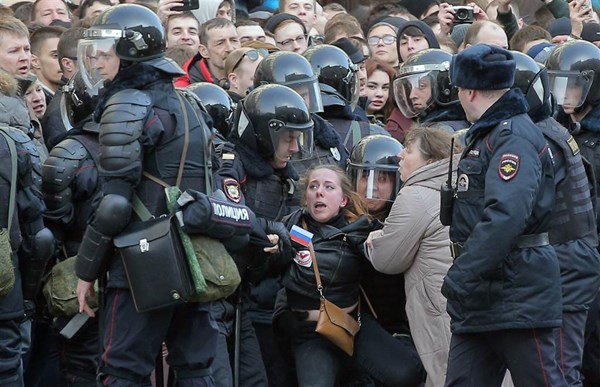Protests in Russia call on Putin not to take part in elections
On April 29, "Nadoyel" (Tired of you) protests took place in numerous Russian cities. The activists urged President Putin not to take part in the presidential elections of 2018. Through the president’s reception office they sent letters addressed to Putin, asking him to end his political career. The protest action was organized by Mikhail Khodorkovsky’s “Open Russia” movement. Founded in 2001, it was initially involved in educational projects. After Khodorkovsky’s verdict in the Yukos case, the organization effectively ceased to operate. Its activity has resumed since Khodorkovsky was released from prison in 2014.
The protests on April 29 had official authorization in several Russian cities. The protests in Moscow and Saint Petersburg were unsanctioned.
Dozens of activists gathered for the protest action in Saint Petersburg. OMON (Special Purpose Mobility Unit) officers urged the citizens to disperse. Mass arrests began after OMON officers surrounded the activists and started gathering them into prisoner transport vehicles. The TV channel “Dozhdy” reported that at least 40 people were arrested.
In Moscow, dozens of participants, journalists and police officers gathered at Slavyanskaya Square, the starting point of the march. Access to the president’s reception office was blocked in the morning, but restricted access through a metal detector was later permitted. Small groups of protesters were allowed in to send letters to Vladimir Putin. During the day, police asked participants in the procession to disperse. “Open Russia” counted one and a half to three thousand participants in the protest in Moscow. The Moscow police mentioned only 250 protesters.
The unsanctioned protests in Kemerovo, where roughly 40 people took part in the rally, resulted in mass arrests. Even before the start, one of its organizers, Dmitry Ulitin, was detained, though he was later released. The Russian website “OVD-Info” reports that there were 16 arrests, including an 8-year old child, who was later collected by parents. All of the detainees were taken to the court building, and one activist, who is being threatened with 10 days incarceration, was left at the police department. According to the activists, the arrests started after one of the participants took out a banner with the word “Nadoyel” (Tired of you), and those gathered started to chant “Nadoyel”.
There were arrests in Tula, Tyumen, Novokutznetsk, Izhevsk and several other cities. In Tula nearly all the protest participants were arrested – about 30 people. In Tomsk the authorities activated loudspeakers and used street cleaning machines to interfere with the protesters’ speeches.
Observers explain the wide spectrum of reactions from the law enforcement agencies at the various Russian cities as the absence of centralized instructions from the Kremlin on how to react to the protesters. Thus journalist Vladimir Varfolomeev is convinced that there was no single instruction from the Russian Presidential Administration.
Mikhail Khodorkovsky, founder of the “Open Russia” movement, has already commented on the protest, calling it “successful”.
“People came [to the protest] in a completely legal manner. They had full rights on their day off to bring letters to the Presidential Administration with the requests which are outlined in these letters,” Khodorkovsy said in a video on the “Open Russia” Youtube channel. He called the arrests of “Nadoyel” protest participants in Saint Petersburg a demonstration of the “inadequacy” from the local authorities.
Several days before the protest, the Prosecutor General’s Office recognized “Open Russia” as an “undesirable organization”, and mentioned that the initiative concerns “only societies registered in England”.
